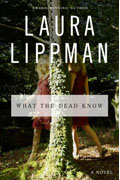
The Morning News Tournament of Books, sponsored by Powell’s Books, is an annual battle royale amongst the top novels in “literary fiction” published throughout the year. Read more about this year’s tournament »
» Buy the Books at Powells.com «
» Meet This Year’s Judges «
» Wager for Charity «
» Relive the Action: ’07, ’06, ’05 «
» Contact the Tournament Staff «
• ROUND ONE • MATCH SIX •
March 14, 2008
 |
What the Dead Knowby LAURA LIPPMAN |

|
| v. | ||
The Brief Wondrous Life of Oscar Waoby JUNOT DÍAZ |
judged by ELIZABETH McCRACKEN
The Tournament of Books came at the right time for me: I’d spent the fall semester teaching three classes of undergrads while juggling a baby and had scarcely read a whole book in months. The undergrads were sweet, but occasionally wrote sentences like this: “Her eyes reeked of curiosity.” The baby was also sweet—I even preferred him to the undergrads—but he left me so sleep-deprived that one day I got in a car with him and a friend from Des Moines and headed out to New York City from Saratoga Springs; after driving three and a half hours we arrived in Syracuse, even further away from our destination than when we’d started.
But by January classes were over and the baby was sleeping through-the-nightish, and I was ready to read some excellent sentences. And then I got my assigned books, and one of them was Run, by Ann Patchett. However, I imagine that if you can answer “Yes” to any of the following questions, you should probably recuse yourself from judging a book:
- Has author ever given you first aid?
- Have you and author ever sung along to Edwin Starr’s “War” on a jukebox in a smoky bar, and found yourself agreeing, when asked, that War was good for (Hunh!) absolutely nothing?
- Has author ever dedicated a book to you?
- Has author’s dog ever eaten a pair of your underpants?
To be honest, said dog did not consume the entire pair of underpants, said book dedication was shared, and said jukebox in said smoky bar was nearly 20 years ago, but we still (say it again) feel that war is good for absolutely nothing, and I could not possibly even pretend to be unbiased about Ann’s work. So instead I was sent Junot Díaz’s The Brief Wondrous Life of Oscar Wao and Laura Lippmann’s What the Dead Know.
Shame, I thought, because I could judge this contest looking at the covers. I’m a huge Junot Díaz fan. I teach his stories. Like all Díaz fans I’d been looking forward to this book for more than a decade. The Lippman book, on the other hand, identifies her as a great “crime writer,” and I don’t read much genre fiction.
Don’t get me wrong: I like murders in fiction. A lot. And I don’t mind the trappings of genre; I adore genre straddlers like Lethem, Lehane, and Kelly Link. But I want glorious language first, depth of character a close second, and everything else after. Cram all the Pinkertons, Shamuses, Cold War spies, werewolves, unicorns, and rainbows you want in a novel; I’ll read it as long as it has great language and interesting characters. (Not vampires, though. I can’t abide vampires.) But a straight crime novel? Clearly it was going to be Díaz in a walk.
The Brief Wondrous Life of Oscar Wao was everything I’d been led to believe it would be: hilarious, wonderfully written, with great sympathy for its oddball characters. It also manages to give a picture of the Dominican Republic during and after the reign of the dictator Rafael Trujillo. Díaz switches narrators and decades; he footnotes shamelessly; he writes about the intersection of historical figures on his own fictional characters with chutzpah and grace. I finished it feeling I knew more than I had when I started, and I was grateful for its weird blend of high-mindedness and low culture, its jokes, its fearlessness.
And yet. And yet I was missing something. Specifically, I was missing the characters, because Díaz introduces one character, infuses that character with a complicated soul, with passion and fascinating shortcomings, and just when I thought, “Great! Now let’s see what this character does!” the book would jump forward or backward to another character and do the same thing. The eponymous Oscar is, as reviews have pointed out, a terrific creation, an enormous heartsick science-fiction nerd, frustrating and heroic and true. And I spent much of the book missing him, even as I admired Díaz’s love for Oscar’s sister, mother, aunt, grandfather, etc. The book is great but frankly, it feels long on back-story and short on plot.
There, I said it. I want language and character but I also want plot, by which I mean: I don’t want to be merely shown all the things that shaped a character’s soul: I want all that, and to know what, given the shape of that soul, a character actually does. The last 40 pages of The Brief Wondrous Life of Oscar Wao are stupendous. That’s when the plot finally grabbed me by the ear, and I wasn’t just admiring but enthralled.
I went into Laura Lippman’s book looking forward to the promised plot and suspense, and indeed she serves it up: A woman in her late 30s flees the scene of a car crash on a slick road in Baltimore, and then claims to be “one of the Bethany girls,” a pair of sisters who’d disappeared from a mall 30 years before. But is she? What the Dead Know jumps back and forth in time and point-of-view: before the disappearance and after, and between both sisters, both parents, the mysterious woman, her social worker, her lawyer, the detective assigned to the case in the present, and the detective who’d covered the disappearance when it happened. The sort of jumps, in other words, that in a straight literary novel might be referred to as “tour de force” but which for Lippman are simply the techniques she needs to use to create the sympathy, suspense, and mystery necessary to keep her readers interested and guessing. In other words, she kept me dancing around the story so effortlessly that I never looked down at my feet, I just made the leap. And she managed to let me guess the final plot twist at exactly the right time: I nearly throttled the book as I read on to see if I was right.
And yet. The prose is good, but it’s not glorious; the characters are vivid on the page but I didn’t miss them when the book switched away from their point-of-view, and I don’t miss them now.
I still miss Oscar. Díaz. In a walk.
• About the Judge •
• From the Booth •
| It’s not just enough to say that the appreciation of literature is subjective, but that this subjectivity is moving constantly along several different axes. | Kevin | John | When I was a child, my mom had a brief spasm of injecting some health into our baked goods and tried substituting carob for chocolate. |
» Read Kevin Guilfoile & John Warner’s commentary on the match «

» DOWNLOAD THE BRACKETS «
• Round One •
Tree of Smoke v. Ovenman
judged by Tobias Seamon
The Savage Detectives v. Let the Northern Lights Erase Your Name
judged by Elizabeth Kiem
Then We Came to the End v. Petropolis
judged by Anthony Doerr
You Don’t Love Me Yet v. New England White
judged by Jessica Francis Kane
Run v. Shining at the Bottom of the Sea
judged by Kate Schlegel
What the Dead Know v. The Brief Wondrous Life of Oscar Wao
judged by Elizabeth McCracken
On Chesil Beach v. Remainder
judged by Ze Frank
The Shadow Catcher v. An Arsonist’s Guide to Writers’ Homes in New England
judged by Helen DeWitt
• Round Two •
Tree of Smoke v. Let the Northern Lights Erase Your Name
judged by Mark Sarvas
Then We Came to the End v. You Don’t Love Me Yet
judged by Maud Newton
Shining at the Bottom of the Sea v. The Brief Wondrous Life of Oscar Wao
judged by Ted Genoways
Remainder v. The Shadow Catcher
judged by Mark Liberman
• SEMIFINALS •
Tree of Smoke v. Then We Came to the End
judged by Gary Shteyngart
The Brief Wondrous Life of Oscar Wao v. The Shadow Catcher
judged by Nick Hornby
• ZOMBIE ROUND •
Then We Came to the End v. Remainder
judged by Rosecrans Baldwin
The Brief Wondrous Life of Oscar Wao v. The Savage Detectives
judged by Andrew Womack
• FINAL ROUND •
Remainder v. The Brief Wondrous Life of Oscar Wao
All Judges + Jennifer Szalai

